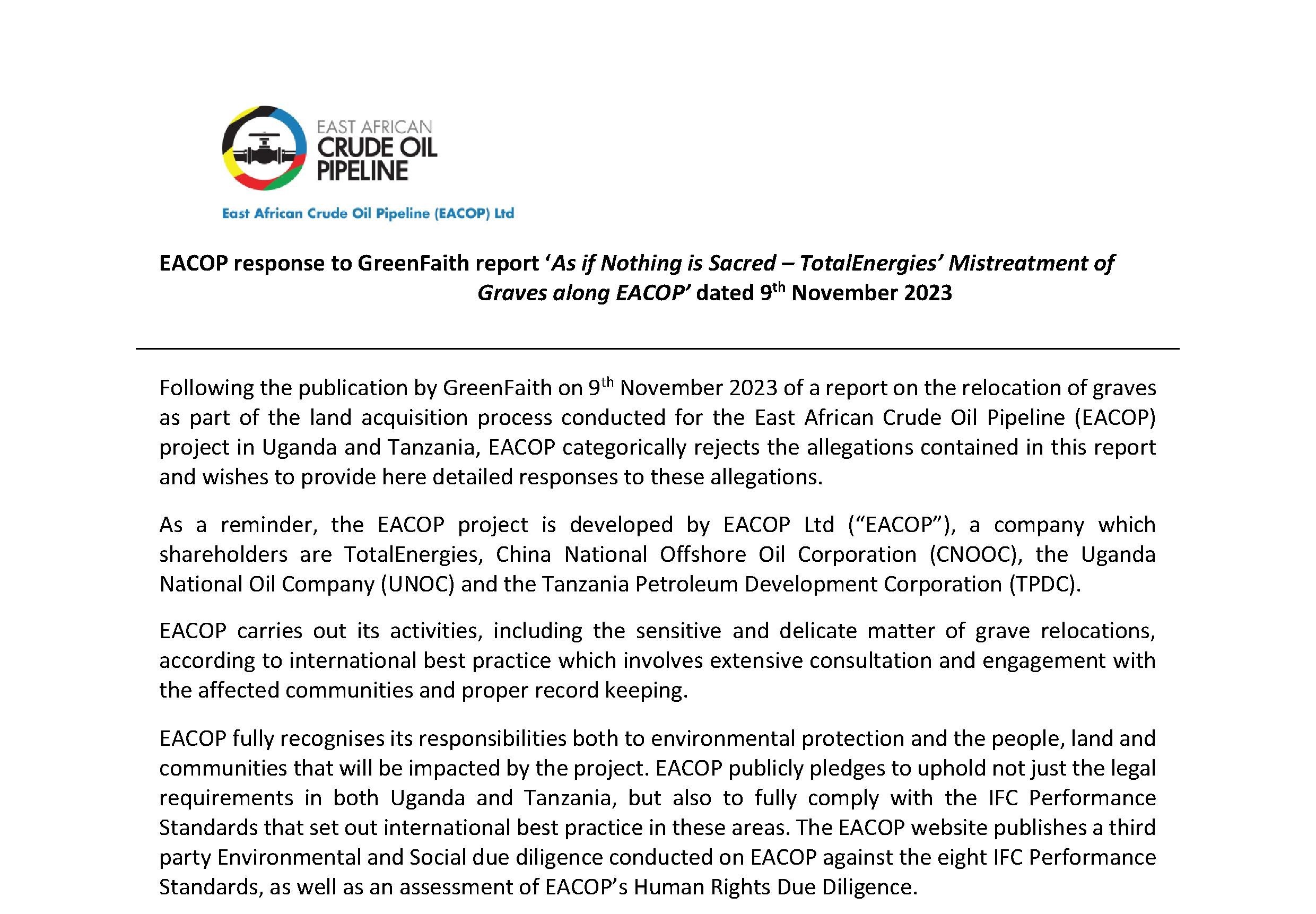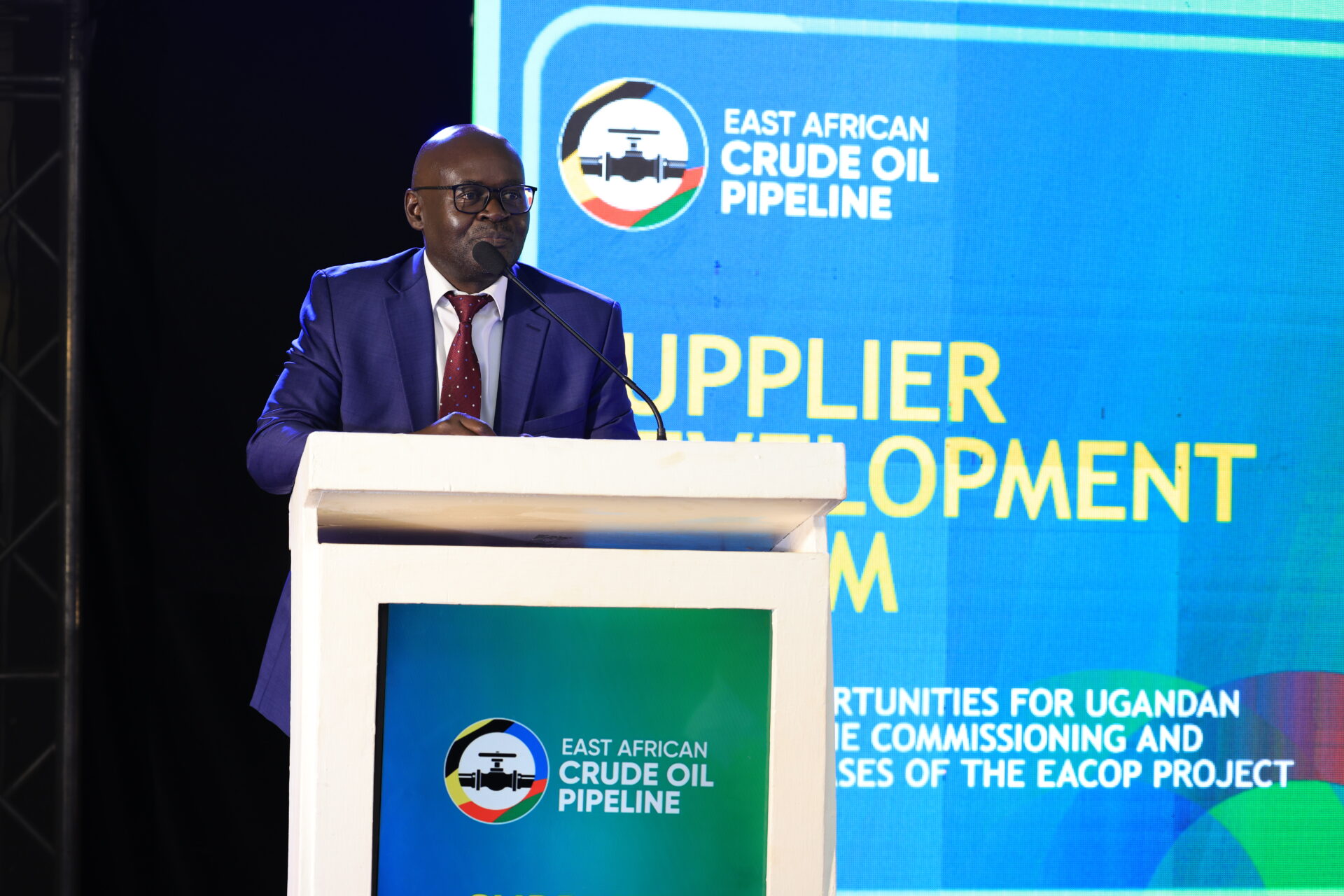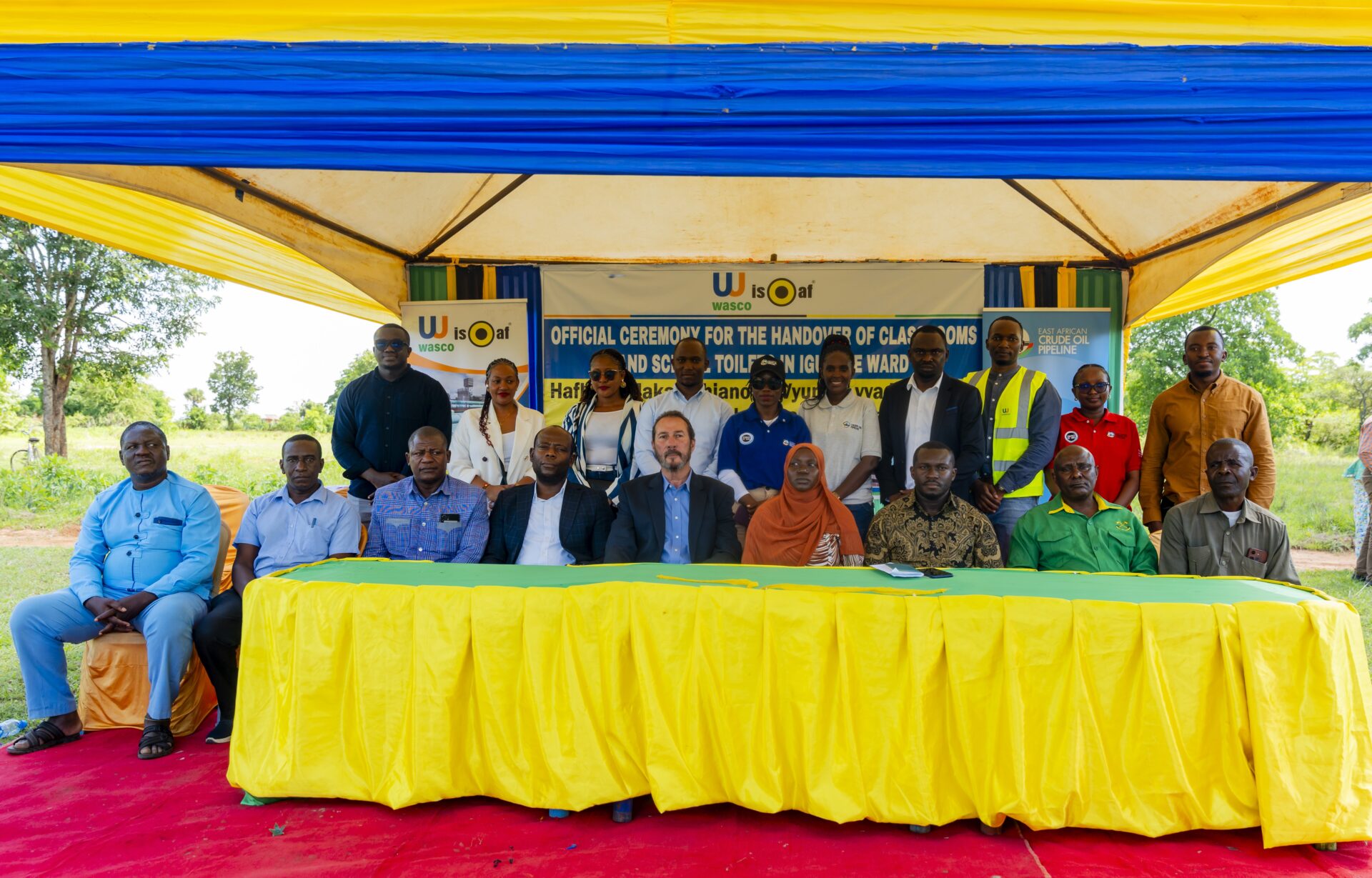EACOP response to GreenFaith report ‘As if Nothing is Sacred – TotalEnergies’ Mistreatment of Graves along EACOP’ dated 9th November 2023
Following the publication by GreenFaith on 9th November 2023 of a report on the relocation of graves as part of the land acquisition process conducted for the East African Crude Oil Pipeline (EACOP) project in Uganda and Tanzania, EACOP categorically rejects the allegations contained in this report and wishes to provide here detailed responses to these allegations.
As a reminder, the EACOP project is developed by EACOP Ltd (“EACOP”), a company which shareholders are TotalEnergies, China National Offshore Oil Corporation (CNOOC), the Uganda National Oil Company (UNOC) and the Tanzania Petroleum Development Corporation (TPDC).
EACOP carries out its activities, including the sensitive and delicate matter of grave relocations, according to international best practice which involves extensive consultation and engagement with the affected communities and proper record keeping.
EACOP fully recognises its responsibilities both to environmental protection and the people, land and communities that will be impacted by the project. EACOP publicly pledges to uphold not just the legal requirements in both Uganda and Tanzania, but also to fully comply with the IFC Performance Standards that set out international best practice in these areas. The EACOP website publishes a third party Environmental and Social due diligence conducted on EACOP against the eight IFC Performance Standards, as well as an assessment of EACOP’s Human Rights Due Diligence.
EACOP regrets that it was not consulted by GreenFaith before the publication of this report and that both the specific allegations on grave relocations and the more general ones concerning numbers of people displaced or non-payment of compensations were not subject to elementary fact-checking.
If GreenFaith can provide specific cases of grievances that EACOP is not aware of, EACOP pledges to fully investigate and resolve them in full confidence.
Graves Relocation in EACOP Land Acquisition
It is recognised by EACOP that grave relocation is a sensitive part of land acquisition for the households involved. In East Africa, traditionally each community or family unit have a designated burial site usually on family or community land close to where they live. Cremation and village cemetery type burials are not common practice unless someone has no known family connection or has willed to be cremated or buried at a church/ village cemetery. Due to the sensitive nature of this issue, EACOP has consulted extensively to determine applicable cultural rites depending on the family or community/tribe to be fulfilled prior to and during grave relocation. Each household, community or tribe will have cultural and religious specificities which must be determined prior to relocation.
As part of the land acquisition preparation, EACOP has identified cultural heritage, including graves, but also shrines and other items of cultural significance such as spiritual sites, places of worship or archaeology, in accordance with IFC Performance Standard 8 on cultural heritage. Route selection design took these cultural heritage factors into consideration and avoidance of burial sites was implemented to the extent possible. In compliance with IFC Performance Standard 8, EACOP has developed:
- a Cultural Heritage Management Plan that forms part of the broader Social Management Plan
- a Chance Finds Procedure
- a Grave Relocation Procedure
As part of the land and asset survey process, graves whether marked or unmarked were reported and identified by families or grave owners and the locations captured by the Project. Grave owners are qualified as Project Affected Persons (PAPs), irrespective of whether they have land, structures, crops or trees or not. Relocation of graves is compensated according to values agreed with the chief valuer, and additionally the relocation is paid for by EACOP. Cultural Heritage experts consulted with PAPs to verify unmarked graves.
After identification, the relocation of graves is carried out as follows:
- The grave owners are consulted as to whether they wish to relocate the graves themselves, or if they require EACOP to relocate the grave on their behalf at no cost to them. In almost all cases in Uganda and in all cases in Tanzania, grave owners elected for EACOP to do these relocations.
- Religious services and rituals at the original grave location and at the new burial site chosen by the grave owner take place according to the local tradition. Respect for all different religions or spiritual beliefs is demonstrated. This is outlined in a scoping form, signed off by the PAP, as an acknowledgement of receipt of funds to support purchases of goods and services for such ceremonies.
- Relocation takes place at the time and day of the grave owners wishes (some take place at night). The District Medical Officer is the custodian of the process. The remains are treated with the utmost respect and buried with a new coffin and placed in a marked grave. Exhumation and reburial are done by professional companies who also engage workers from the community.
- Most relocations were done to land belonging to and agreed with the PAPs. In some cases where PAPs had insufficient land, EACOP acquired a plot on the PAP’s behalf for reburial.
- For certain deceased Notables or spiritual leaders additional and special ceremonies take place which are supported by EACOP.
- When the process is completed, PAPs signed off that they were satisfied with the final relocation, and these individual forms are retained as part of record keeping.
This grave relocation process is carried out as part of the overall land acquisition process and is completed prior to the project accessing the land for construction purposes.
in addition, as per Best Practices, EACOP also has established a Chance Finds Procedure to deal with unexpected finds during the construction phase. This includes:
- Ahead of site works specialists also engage in “pre-clearance surveys” to do a final assessment to determine possible existence of cultural heritage resources
- During soil stripping and clearing, the Chance Finds Procedure is applied meaning that land is monitored for any indication of a chance find.
- If something is identified then work is stopped and the area protected. The EACOP Cultural Heritage monitor is sent for to inspect the site.
- If unclaimed human remains are confirmed, police must first investigate and followed by consultations to determine the relocation process.
To date, for the EACOP project, 656 graves to be relocated were identified in Uganda and 1,124 graves to be relocated were identified in Tanzania, out of which 97% are relocated as of today.
Lastly, EACOP also maintains a non-judicial Grievance Mechanism. Whilst some grievances have been raised and closed identifying additional graves since the initial surveys, there are no grievances recorded relating to the relocation process itself.
Responses to the specific points raised in GreenFaith report
Below are detailed responses to the specific points raised in GreenFaith report:
- Research for the report relied on public documents and information gathered through field research
We regret that GreenFaith did not seek to contact EACOP prior to releasing their report, either for fact checking or cross-referencing specific cases. EACOP maintains full and comprehensive records, for each PAP, of meetings, consultations and grave relocations.
- EACOP and Tilenga (The Project) will disturb and disrespect more than 2000 graves in local communities in Uganda and Tanzania.
The project has always been transparent about the land acquisition and grave relocation processes. For EACOP project, 656 graves to be relocated were identified in Uganda and 1,124 graves to be relocated were identified in Tanzania. Across the two countries 97% are relocated as of today.
- TotalEnergies has not taken steps consistent with local tradition, international best practices, or common engineering practices to prevent the disturbance or destruction of graves.
This is not correct. Local tradition, international best practices and common engineering practices have been followed. As previously explained, Graves (marked and unmarked), cemeteries, sacred sites, sites of community importance were identified during the ESIA and Land Planning phase. Avoidance is done as much as practically possible, mainly during the pipeline routing design phase but also more recently if situations arise.
Examples include:
- The GreenFaith report on page 20 makes reference to a person in Uganda stating that EACOP did not relocate some graves. In this particular case and following engagement, a modification of EACOP pipeline route was agreed in 2023 such that none of his graves are impacted by the pipeline route.
- In Tanzania a narrowing of a section of the Pipeline right of way to avoid removing the grave of the Bung’eda chief Grave at Gorimba Village in Hanang District.
- In Tanzania a re-routing of the Pipeline was made to avoid impacting the Taturu graveyard at Mwamayoka Village in Igunga District. A Free Prior and Informed consent agreement was signed with Taturu community in March 2023.
For graves that cannot be avoided, a scoping is done involving extensive consultations to ascertain cultural and religious requirements for a relocation
A watchlist is provided to the construction team of graves adjacent to the right of way as a set of validated coordinates to ensure that protection put in place and so no unnecessary construction disturbance occurs and to also ensure that the Chance Finds Procedure is implemented in the event of an unplanned find during construction.
- TotalEnergies regularly disregarded the pleas of local families to respect actual graves and ignored information which families or community members shared about the location of graves.
This is not correct. Both marked and unmarked graves were identified during the survey phase with families and community members. No potential graves were knowingly disregarded. During the land process new graves were sometimes found as a result of information from local families sometimes in meetings and sometimes via the Grievance process; these were systematically investigated and relocated if confirmed and on the right-of-way.
PAPs with graves are engaged at various stages during the land acquisition process:
- During the ESIA process when all graves, sacred sites and cemeteries are identified.
- During the valuation process, during which critical information about the graves and deceased are captured, to ensure that appropriate funeral and expiatory rights are observed.
- During the entitlement briefings process when the computation of compensation for grave and grave removal is done, and the legal process that is required to remove graves, is explained.
- In Tanzania, during the process to apply for death certificates, EACOP assisted 1060 grave owners / PAPs to apply (complete applications, pay and retrieve certificates) to the courts for death certificates in order for graves to be legally gazetted.
- PAPs are engaged to ensure that all traditional rights have been conducted to allow for the removal of graves. For example, the project provided additional financial support to assist one clan to perform rituals for relocation of the grave for their Chief in Kahama District.
- In many cases, Project officials failed to properly compensate families whose graves were disturbed
or impacted.
This is not correct. EACOP is responsible for compensation, and graves relocated are compensated prior to relocation. Grave compensation amounts are determined according to Government valuations, and this rate is then transposed into the individual Compensation Agreements. In addition to compensation payments made, EACOP has covered the costs for the relocation of graves including for the performance of traditional rites and rituals.
Two (2) unknown/unclaimed graves have been moved. This was done with the express permission from the Government of Tanzania preceded by the payment of compensation into the EACOP escrow account, recording all known grave information including coordinates and communicating this process through the district and local leadership structures to make communities aware.
- Household relocation due to EACOP restricts or eliminates access to graves, leading to a painful violation of cultural norms and practices.
This is not correct. The areas where graves are relocated are chosen expressly by the affected PAPs.
Once a site is selected by the PAPs and the PAPs have conducted all relevant traditional rights, the grave relocation team conducts the work under supervision from government (central and District Authorities – Tanzanian process) including:
- District Health Officer
- District Police/Security Officer
- Local Village Executive Officers/Ward Executive Officers and Village Chairperson
- TPDC Officers.
- Officials from the Ministry of Energy, Ministry of Land and Ministry of Minerals
PAPs were engaged on how the grave removal is to be conducted. Family members were invited to participate and witness how this was conducted. EACOP facilitated the participation of Spiritual leaders (Muslims, Christians etc) to perform prayers during exhumation and reinterment.
PAPs have unimpeded access to the District and EACOP grievance mechanisms at all times to report any issues encountered (for instance in Tanzania 34 grievances relating to graves identification have been recorded by EACOP between 2018-2023, with each issue being successfully closed).
- Family members and local communities suffer severe emotional and spiritual distress due to the disturbance of or impact on graves, and due to Project officials’ lack of consideration.
EACOP understands the relocation of graves is a sensitive process. EACOP has ensured that engagement has been conducted continuously from beginning to end on grave relocations including providing assistance and support to PAPs where required.
PAPs have access to District and EACOP grievance mechanisms to express any concerns about the grave removal process, EACOP has responded to all issues raised as demonstrated by the number of supplementary valuations conducted to assure affected PAPs.
No incidents of refusals or legal redress from PAPs to remove graves have been recorded during the entire grave removals planning and implementation process.
EACOP agreed to provide caskets and other burial materials to communities which had unclaimed graves. EACOP also provided support to local communities who had made cemetery space available for this support, to ensure proper reburial and the accordance of respect to the departed.




